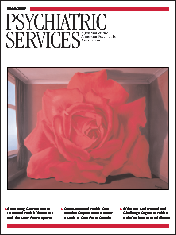Spirituality and Religious Practices Among Outpatients With Schizophrenia and Their Clinicians
Abstract
OBJECTIVES: Religious issues may be neglected by clinicians who are treating psychotic patients, even when religion constitutes an important means of coping. This study examined the spirituality and religious practices of outpatients with schizophrenia compared with their clinicians. Clinicians' knowledge of patients' religious involvement and spirituality was investigated. METHODS: The study sample included 100 patients of public psychiatric outpatient facilities in Geneva, Switzerland, with a diagnosis of nonaffective psychosis. Audiotaped interviews were conducted with use of a semistructured interview about spirituality and religious coping. The patients' clinicians (N=34) were asked about their own beliefs and religious activities as well as their patients' religious and clinical characteristics. RESULTS: Sixteen patients (16 percent) had positive psychotic symptoms reflecting aspects of their religious beliefs. A majority of the patients reported that religion was an important aspect of their lives, but only 36 percent of them had raised this issue with their clinicians. Fewer clinicians were religiously involved, and, in half the cases, their perceptions of patients' religious involvement were inaccurate. A few patients considered religious practice to be incompatible with treatment, and clinicians were seldom aware of such a conflict. CONCLUSIONS: Religion is an important issue for patients with schizophrenia, and it is often not related to the content of their delusions. Clinicians were commonly not aware of their patients' religious involvement, even if they reported feeling comfortable with such an issue.



